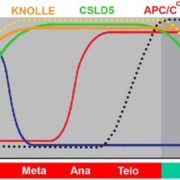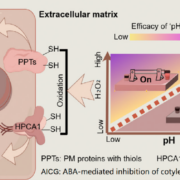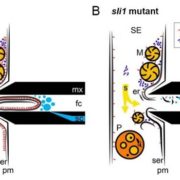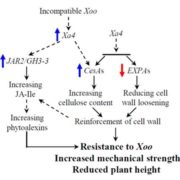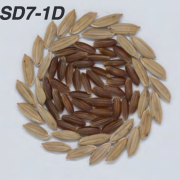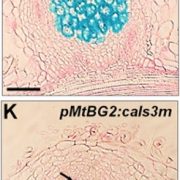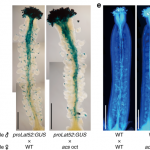Hydration-dependent phase separation of a prion-like protein regulates seed germination during water stress (bioRxiv)
 Plant seeds can remain dormant for several years under stress conditions and subsequently germinate once favorable conditions return. Even though this phenomenon has been known for many years, what keeps the seed from germinating during the unfavorable conditions, especially during water deficit conditions, is not known. In this paper, Dorone et al. identified an intrinsically disordered protein (IDP) with a prion-like domain that they named FLOE1 (floe meaning a “sheet of floating ice”) that prevents seed germination during water stress conditions. Phylogenetic analysis shows that FLOE proteins are conserved in all green plants and predates seed evolution. The authors showed that FLOE1 distributes uniformly during dry conditions and phase separates to forms condensates during favorable conditions. Through deletion of various domains, the authors generated variant proteins with different condensation and gelling properties, which revealed the key role of FLOE1 in controlling germination. Loss-of-function mutants germinate (and die) under unfavorable conditions, and expression of the ΔDS protein that forms larger and more stable condensates than WT also showed greatly enhanced germination under salt-stress conditions. The authors suggest that FLOE1 acts upstream of key germination pathways, and that it “might act as a molecular glue helping to stabilize the desiccated glassy state” and prevent germination. Thus, this paper provides molecular insights into seed dormancy during water stress conditions and has agronomical implications in crop improvement. (Summary by Vijaya Batthula @Vijaya_Batthula) bioRxiv 10.1101/2020.08.07.242172
Plant seeds can remain dormant for several years under stress conditions and subsequently germinate once favorable conditions return. Even though this phenomenon has been known for many years, what keeps the seed from germinating during the unfavorable conditions, especially during water deficit conditions, is not known. In this paper, Dorone et al. identified an intrinsically disordered protein (IDP) with a prion-like domain that they named FLOE1 (floe meaning a “sheet of floating ice”) that prevents seed germination during water stress conditions. Phylogenetic analysis shows that FLOE proteins are conserved in all green plants and predates seed evolution. The authors showed that FLOE1 distributes uniformly during dry conditions and phase separates to forms condensates during favorable conditions. Through deletion of various domains, the authors generated variant proteins with different condensation and gelling properties, which revealed the key role of FLOE1 in controlling germination. Loss-of-function mutants germinate (and die) under unfavorable conditions, and expression of the ΔDS protein that forms larger and more stable condensates than WT also showed greatly enhanced germination under salt-stress conditions. The authors suggest that FLOE1 acts upstream of key germination pathways, and that it “might act as a molecular glue helping to stabilize the desiccated glassy state” and prevent germination. Thus, this paper provides molecular insights into seed dormancy during water stress conditions and has agronomical implications in crop improvement. (Summary by Vijaya Batthula @Vijaya_Batthula) bioRxiv 10.1101/2020.08.07.242172


